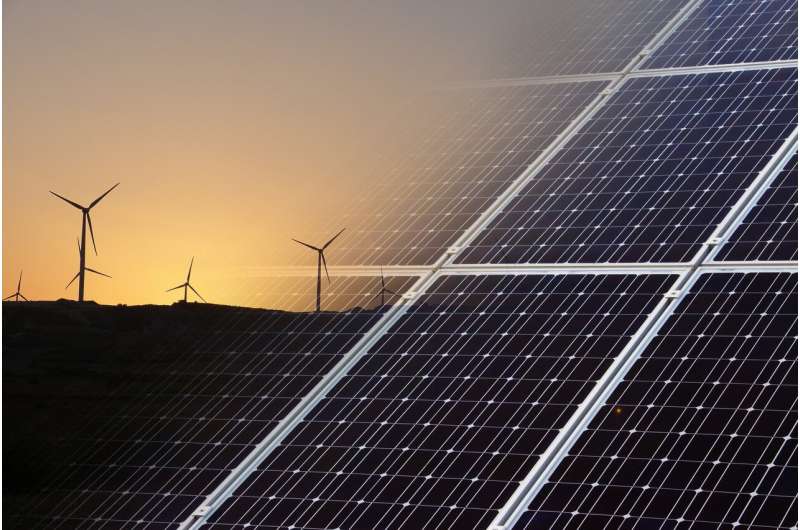Renewable energy zoning initiative expands to six states

An expanded renewable energy zoning database from the University of Michigan brings together more than 1,600 local ordinances from six Great Lakes states.
The Energy Zoning Database is designed to simplify matchmaking between renewable energy developers and interested host communities in Illinois, Indiana, Michigan, Minnesota, Ohio and Wisconsin.
Recent federal policy incentives coupled with declining prices have increased the market for renewable energy, with companies and utilities eager to add more wind and solar to the energy mix.
But until now, information about renewable energy zoning ordinances has been scattered across small local-government websites—or in the case of many rural communities, in paper files.
With thousands of local governments across the country setting the rules for siting solar and wind developments, searching for potential matches has been a labor-intensive process.
The expanded Energy Zoning Database is designed to inform and improve decision making. It can be used by communities undergoing the rezoning process, developers seeking host communities and academics engaging in community-based research.
The data covers zoning jurisdiction, zoning ordinance collection and zoning ordinance analysis and is presented with the visual aid of interactive maps for each state. Users have filterable, sortable access to each community’s ordinances to read firsthand.
For communities that regulate principal-use solar energy systems, the database identifies 17 characteristics commonly found in solar energy zoning regulations.
This newly expanded public resource, funded by the U.S. Department of Energy’s Solar Energy Technologies Office, builds on a Michigan-focused project started in 2019 with funding from the Michigan Department of Environment, Great Lakes, and Energy.
The database was created by a University of Michigan research team and includes a precise guide to recreating the tool with other datasets.
“We’re already getting interest from NGOs and researchers at other universities who want to extend our approach to other states,” said Madeleine Krol, clean energy land use specialist at U-M’s Graham Sustainability Institute and a member of the research team.
The Energy Zoning Database is part of a larger Department of Energy project designed to trace how knowledge of solar energy informs zoning and provides local officials with tools to create zoning ordinances that reflect community values.
The project is led by Michael Craig, an assistant professor in energy systems at the U-M School for Environment and Sustainability. Craig, an energy modeler, will use the detailed analysis of solar attributes to determine how zoning decisions impact the ability to meet the demand for and deploy renewables.
“The media turns its attention to communities with restrictive zoning, calling for state governments—including Michigan—to rein in local governments,” he said. “By analyzing the robust collection of ordinances in the Energy Zoning Database, we can determine the true impact of local regulations on states’ and utilities’ ability to meet renewable energy targets.”
The Energy Zoning Database team of six undergraduate and graduate students, plus Krol and Sarah Mills, senior project manager at the Graham Sustainability Institute, continues its work.
The 1,600+ zoning ordinances currently in the database represent 50% of the region, and the team aims to cover at least 90% of rural areas in these six states in the next several months.
Citation:
Renewable energy zoning initiative expands to six states (2023, April 26)
retrieved 26 April 2023
from https://techxplore.com/news/2023-04-renewable-energy-zoning-states.html
This document is subject to copyright. Apart from any fair dealing for the purpose of private study or research, no
part may be reproduced without the written permission. The content is provided for information purposes only.
For all the latest Technology News Click Here
For the latest news and updates, follow us on Google News.

